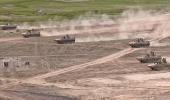Roughly 75 percent of the "disengagement problems" with China are sorted out but the bigger issue has been the increasing militarisation of the frontier, external affairs minister S Jaishankar said on Thursday on the lingering border row in eastern Ladakh.

In an interactive session at a think-tank in this Swiss city, Jaishankar said the Galwan Valley clashes of June 2020 affected the "entirety" of India-China ties, asserting that one cannot have violence at the border and then say the rest of the relationship is insulated from it.
The external affairs minister said both sides have been engaged in negotiations for the last four years to find a solution to the outstanding issues.
"Now those negotiations are going on. We made some progress. I would say roughly you can say about 75 percent of the disengagement problems are sorted out," he said at the Geneva Centre for Security Policy.
"We still have some things to do," Jaishankar, who is on a two-day visit to Switzerland, said.
But there is a bigger issue that both of us have brought forces close up and in that sense there is a militarisation of the border, he said.
"How does one deal with it? I think we have to deal with it. In the meanwhile, after the clash, it has affected the entirety of the relationship because you cannot have violence at the border and then say the rest of the relationship is insulated from it," he said.
The external affairs minister indicated that the relationship can improve if there is a resolution to the row.
"We hope that if there is a solution to the disengagement and there is a return to peace and tranquility, then we can look at other possibilities," he said.
The Indian and Chinese militaries have been locked in a standoff since May 2020 and a full resolution of the border row has not yet been achieved though the two sides have disengaged from a number of friction points following a series of talks.
The ties between the two countries nosedived significantly following the fierce clash in the Galwan Valley in June 2020 that marked the most serious military conflict between the two sides in decades.
India has been maintaining that its ties with China cannot be normal unless there is peace in the border areas.
Describing India-China relations as "complex", Jaishankar said the ties were kind of normalised in the late 1980s and the basis for it was that there would be peace at the border.
"The basis obviously for a good relationship, I would say even for a normal relationship, was that there would be peace and tranquility in the border. After things started to take a better turn in 1988, we had a series of agreements which stabilised the border," he said.
"What happened in 2020 was in violation of multiple agreements for some reasons which is still entirely not clear to us; we can speculate on it."
"The Chinese actually moved a very large number of troops to the Line of Actual Control at the border and naturally in response we moved our troops up. It was very difficult for us because we were in the middle of a Covid lockdown at that time," he said.
Jaishankar described the development as very dangerous.
"Now we could see straight-away that this was a very dangerous development because the presence of a large number of troops in these extreme heights and extreme cold in near proximity could lead to a mishap. And that's exactly what happened in June 2022," he said, referring to Galwan Valley clashes.
The external affairs minister said the issue for India was that why China disturbed the peace and tranquility and why they moved those troops and how to deal with this very close up situation.
"We have now been negotiating close to four years and the first step of that is what we called disengagement which is their troops go back to their normal operating bases and our troops go back to their normal operating bases and where required we have an arrangement about patrolling because both of us patrol regularly in that border as I said it is not a legally delineated border."
The ties between the two sides were affected in various domains including trade.
"Trade has got affected; exchanges have got affected. So it (the relationship) is not normal to put it very politely," he said.
The external affairs minister said though the border situation is the immediate priority, there are larger issues in India-China relations as well.
"That is the immediate issue. But I think there are larger issues with respect to India-China. We have long struggled with trade issues," he said.
The ballooning trade deficit in China's favour has been a major irritant in the ties before the border row erupted in April 2020.
Jaishankar also provided a historical perspective to the India China relationship and explained why it is a very complex one.











 © 2025
© 2025